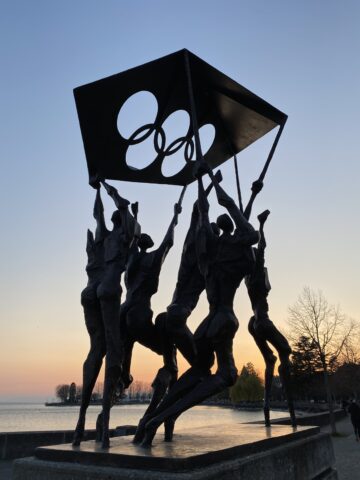International sports dispute resolution in 2023
A review of CAS, Swiss Federal Tribunal and other important judgments rendered in 2023 & major regulatory reforms
Several major sporting events took place in 2023, including the Womens World Cup in Australia in the summer of 2023, that ended with a widely publicised case of the “Rubiales kiss” and a FIFA Disciplinary Committee decision suspending the President of the Spanish Football Federation for three years (the decision is currently under appeal). The Asian Games also took place in September 2023 in China but did not generate any disputes for the CAS Ad Hoc Division present on site during the games. July was the busiest month in terms of important international sports law judgments rendered, with the most important being the European Court of Human Rights (ECtHR) judgment in the application of the South African athlete Caster Semenya against Switzerland. December was an equally crucial month for European sports law, as the CJEU rendered its judgment in the Super League case, in the International Skating Union (ISU) case and the Antwerp case on the “home-grown players rule”.
Swiss Federal Tribunal judgments in motions against CAS Awards
In 2023, the Swiss Federal Supreme Court (SFT) issued several noteworthy judgments in motions against awards rendered by the Court of Arbitration for Sport (CAS). In most of them, it reiterated the high admissibility threshold. Accordingly, pleas of appellatory nature are generally inadmissible, but also the parties have an obligation to raise any procedural irregularities / violations of the right to be heard in an explicit and unequivocal manner as soon as they arise.
Furthermore, the SFT re-confirmed its very strict view of violation of public policy. There is, in principle, no violation of public policy in case of the late uploading of a statement of appeal on the e-filing platform, the lack of online hearing of (protected) witnesses, several extensions of the time limit to issue the arbitral award, the non-transmission of the full decision to a complainant in sports disciplinary proceedings, or in case of disciplinary sanctions imposed parallelly at the national – and the international level. The SFT also reiterated its view that violations of the European Convention of Human Rights (the Convention) cannot be directly invoked but only through the limited scope of public policy and the Swiss Constitution; it will be interesting to see how this view will evolve after the ECHR landmark judgment in Caster Semenya (this case is still pending before the ECHR Grand Chamber).
In terms of jurisdiction, the SFT held that CAS jurisdiction could not go beyond the jurisdiction of the previous instance, that the FIFA tribunal (like the CAS Anti-Doping Division) is not a “true arbitral tribunal” and as such is not bound by the pertinent provisions of the Swiss Code on Civil Procedure and that the FIFA Player Status Committee (PSC) ruling on atransfer agreement is not bound to decide on (the unrelated) set-off against a tort claim. The SFT further held that the question of the parties’ legal interest falls outside the scope of ne ultra /infra petita.
With respect to the irregular constitution of the arbitral tribunal, the SFT reiterated that there is no analogy between barristers belonging to the same Chambers (who are all independent and thus not partners) and Swiss lawyers belonging to the same law firm. Therefore, in the absence of additional criteria, such connection cannot on its own establish bias or lack of independence of arbitrators. Inversely, the SFT reinforced its view on the parties’ and the parties’ counsel duty of curiosity, which is clearly violated when they fail to examine notorious facts related to the appointed arbitrators in a timely manner; at the same time, the appointed arbitrators are not obliged to disclose publicly available -and easily discoverable- information.

Selected CAS Awards rendered in 2023
In February 2023, the CAS issued its decision in the appeal filed by the Haitian Football Federation (HFF) President Yves-Jean Bart against a decision of the FIFA Ethics Commission sanctioning him for several violations of the FIFA Code of Ethics for allegations of sexual abuse of members of the female technical team of the HFF. The CAS annulled the FIFA decision holding that there was insufficient evidence and a lack of coherence or credibility in the witness testimony by the alleged victims during the hearing. The decision was unsuccessfully appealed to the SFT.
In March, however, another CAS panel confirmed the life ban imposed by FIFA on the former Haitian Vice-President of the HFF Rosnick Grant for violations of the FIFA Ethics Code, including acts of abuse, sexual abuse, acts of threat and coercion of female arbitrators. Unlike the previous case, the panel in this case found the testimony of a victim credible, precise and coherent. In both cases, the hearing of protected witnesses was a crucial one and led to the CAS recently publishing its “Guidelines for the hearing of vulnerable witnesses and testifying parties in CAS Procedures (December 2023)”.
In March 2023, the CAS partially upheld the appeal of the Ukrainian gymnast Oleg Verniaiev against a decision issued by GEF Disciplinary Commission and reduced the four-year suspension for the presence of Meldonium in his sample to two years. In July 2023, the CAS issued its award in the case of the Swedish tennis player Mikael Ymer, in an appeal filed by the ITF against the decision of the ITF Independent Tribunal that had exonerated the player for whereabouts failures. In appeal, the CAS imposed an 18-month ineligibility period on the player for three whereabouts failures within a 12-month period. Following the CAS award, the player decided to retire from professional tennis.
In July 2023, the CAS issued an award CAS 2023/O/9370 on the legality of FIFA’s Agents Regulations (FFAR), notwithstanding -or rather amid – the pending challenges before state courts in several European countries but also the expected preliminary ruling by the Court of Justice of the European Union (CJEU). In the arbitration proceedings between the Professional Football Agents Association (PROFAA) and FIFA, the CAS Panel confirmed the legality of FFAR and dismissed all claims filed by PROFAA. In essence, the Panel found that Article 15 FFAR (imposing a cap on agents’ fees) does not contravene EU competition law in the sense of Articles 101- 102 of the Treaty on the Functioning of the European Union (TFEU). In the Panel’s opinion, FIFA is authorized to regulate football agents to the extent that the latter directly engage in the core aspects of the football system. It held that whether imposing a service cap leads to FIFA acting as an “association of undertakings” must be assessed under the Wouters / Meca-Medina test.
Interestingly, the CAS found that there was insufficient evidence filed by the claimant to establish abuse of a dominant position and concluded that Article 15 (2) FFAR pursues several legitimate objectives (e.g. fighting contractual instability, conflicts of interest etc.) and any restrictive effects are proportionate to achieve the legitimate objectives sought. The views of the CAS panel have however not been endorsed by other courts: for example, the Madrid Commercial Court, the Dortmund Regional Court or the Mainz Regional Court which referred several questions to the CJEU. The UK FA Rule K Tribunal has already rendered an award on 30 November 2023 finding that an implementation of the fee cap and other rules would infringe the Competition Act 1998.
In July 2023 the CAS also rendered another noteworthy decision in the football transfer of the Senegalese player Pape Alassane Gueye to the French football club Olympique de Marseille from Watford Association FC Ltd. The CAS confirmed the FIFA DRC decision that the player had breached his employment contract with Watford FC and the amount of compensation for breach but annulled the four-month ban of ineligibility on the player and the two registration periods ban on Olympique de Marseille.
The ECtHR Judgment in the case of Caster Semenya v. Switzerland
One of the most important cases of 2023 was undeniably the ECtHR judgment in the matter of South-African, 3-time Olympic champion Caster Semenya. The athlete initially contested the validity of the World Athletics regulations regarding the participation in competitions of Athletes with Differences of Sex Development (DSD Regulations) before the CAS in 2019, which confirmed the validity of said regulations. The SFT subsequently confirmed the CAS award, repeating its long-standing position, whereby a party cannot directly invoke violations of the Convention but only through the very limited scope of public policy and the Swiss Constitution.
However, Semenya filed an application before the ECtHR which essentially found that Switzerland had violated Article 14 in conjunction with Article 8 of the Convention (prohibition of discrimination and respect of private life) but also Article 13 (right to an effective remedy). The ECtHR held that Switzerland failed to provide sufficient institutional and procedural safeguards to protect the athlete from discrimination and exceeded its margin of appreciation (which is narrow for aspects linked to the identity of the individual concerned). In summary, any justification for the discriminatory character of the DSD Regulations on grounds of sex and sexual characteristics required “very weighty reasons” which were not given in the present case.
Interestingly, the Court admitted jurisdiction irrespective of the fact that the athlete was South African and World Athletics is based in Monaco, as long as the review of the CAS award was made by the SFT. As the judgment included a strong dissent (four to three dissenting judges), the request for referral to the Grand Chamber was admitted and the case is still pending.
Beyond the practical effect of the judgment on federations’ future rulemaking and sanctions , it will be particularly interesting to see if the Grand Chamber will confirm the expanded duty of review of CAS awards by the SFT. If confirmed, the SFT would find itself obliged not only to control the compatibility of CAS awards with ordre public but also review the assessment made by the CAS in similar cases. This could have far-reaching consequences for both the CAS and the SFT review and lead to a shift of the long-standing SFT jurisprudence.
Regulatory changes in 2023 and what to expect in 2024

Regulatory changes in 2023
In February 2023, the ICAS enacted new guidelines on legal aid for football-related matters, the Football Legal Aid Fund (FLAF), which is financed directly by FIFA and is available to both natural persons and, exceptionally also to football clubs in a difficult financial situation (excluding those under judicial administration due to insolvency or bankruptcy). Such legal aid fund exists in parallel with the ICAS legal aid fund for all other Olympic sports.
In July 2023, the ICAS published its Annual Report and Financial Statements for 2022, which contains important information on the ICAS and the various CAS divisions but also statistics on the procedures. In December 2023, the ICAS published its “Guidelines for the hearing of vulnerable witnesses and testifying parties in CAS Procedures (December 2023)”.
Furthermore, FIFA enacted the FIFA Agents Regulations (FFAR) in October 2023 but temporarily suspended numerous important provisions on 30 December 2023 following the preliminary injunction by the District Court of Dortmund in Germany in the procedure LG Dortmund, 8 O 1/23 (Kart).
What to expect in 2024
2024 will be a year rich in major sporting events, including the Summer Olympic and Paralympic Games in Paris (from 26 July 2024 to 11 August 2024) and the UEFA Euro 2024 in Germany (from 14 June to 14 July 2024). Both events will likely generate sports-related disputes prior, during and after their termination.
In terms of IOC governance, in June 2023, the CAS dismissed the urgent request for a stay filed by the International Boxing Association (IBA) of the decision rendered by the Executive Board of the International Olympic Committee (IOC), which withdrew the IOC’s recognition of IBA according to Rule 3.7 of the Olympic Charter. The IBA has also filed an appeal to the CAS seeking to annul the decision to recommend the withdrawal of the IOC and a decision should be expected in the coming year.
Another important decision expected in 2024 relates to the appeal of the Russian Olympic Committee (ROC) against the decision of the IOC EB to suspend the former following breaches of the Olympic Charter (namely ROC’s decision to include as its members regional sports organizations which are attached to the NOC of Ukraine).
In terms of doping-related cases, the Romanian tennis player and multiple ATP champion Simona Halep has appealed to the CAS her four-year ineligibility period imposed by the ITF Independent Panel, whereas the award in the case of the Russian figure skater Kamila Valieva is also expected in 2024.
There are also other important proceedings pending before the CAS related to compliance with the WADA Code, involving the Russian Anti-Doping Agency (RUSADA) and the South African Institute for Drug-Free Sport (SAIDS): following a decision by the WADA Executive Committee in September 2023 to declare RUSADA and SAIDS non-compliant with the WADA Code, both agencies have disputed their non-compliance and the matters were submitted to the CAS Ordinary Arbitration Division for a binding decision.
Last but not least, shortly before 2023 came to a close, the CJEU Super League judgment found that certain FIFA and UEFA rules requiring prior approval of new interclub football projects and giving them exclusive control over the commercial exploitation of rights were incompatible with the EU rules on competition and free movement of services. As this was only a preliminary ruling by the CJEU, the Madrid commercial court will be the ultimate arbiter of determining whether the rules are justified, among others by benefitting different stakeholders in football through a solidarity redistribution of the profits generated by media rights. Similarly, following the CJEU judgment on the “home-grown players” rules, it will be for the First Instance Brussels Court to determine whether the Belgian football federation’s rules pursue a legitimate objective by encouraging the recruitment and training of young professional players and are proportionate and necessary for the purpose sought. Finally, as seen above, the FIFA FFAR have triggered numerous legal challenges across several European countries, which are still pending.
Note: this compilation was first published in LawInSport. For a more detailed review of the SFT judgments rendered in 2023, you can see my “Compilation of Swiss Federal Tribunal judgments in motions against CAS Awards rendered in 2023” and my notes available on www.sportlegis.com and www.lawinsport.com.





